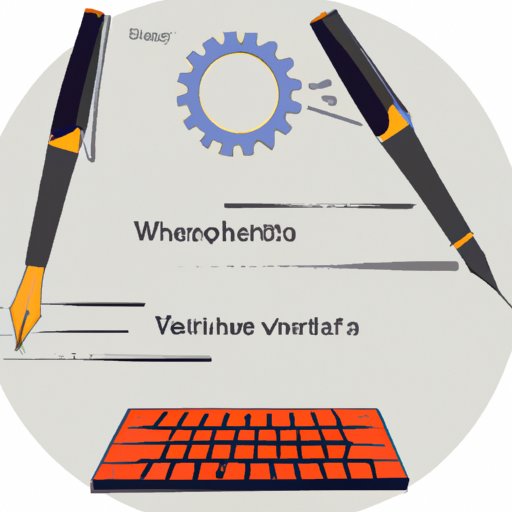Introduction
Technical writing is a form of communication used to convey information about a specific subject or topic. It is often used by businesses, educational institutions, and government agencies to explain complex topics in a concise and easy-to-understand manner. Technical writing requires the writer to have a deep understanding of the subject matter and be able to effectively communicate it to the intended audience.
The benefits of technical writing are numerous. It can help professionals enhance their credibility, improve their communication skills, and increase their marketability. In this article, we will explore what technical writing is, how it is used, and how to develop your skills in technical writing.

Exploring the Basics of Technical Writing
What is technical writing? Technical writing is the practice of creating written documents that explain how to use a product, service, or technology. It is a type of specialized writing that focuses on conveying information clearly and accurately. Technical writing is used in a variety of industries, including engineering, manufacturing, healthcare, finance, education, and government.
Types of technical writing include user manuals, product specifications, white papers, research reports, training materials, and online help. Common elements of technical writing include accurate facts, clear language, supporting graphics, and detailed descriptions.

A Comprehensive Guide to Technical Writing
Developing effective technical writing skills requires a comprehensive approach. The first step is researching and planning. This involves gathering information about the topic, understanding the needs of the target audience, and identifying the purpose of the document. Once you have a plan in place, it’s time to start writing. This includes drafting the document, editing for accuracy, and formatting it for publication.
Once the document is ready, it’s time to publish it. This could involve printing it, posting it online, or distributing it in another format. It’s important to consider the different audiences who will be reading the document and tailor it to meet their needs.
What is Technical Writing and How is it Used?
Technical writing is used in a variety of applications. It is used to create user manuals, product specifications, software documentation, training materials, and research reports. Technical writing is also used to provide instructions on how to use a product or service, explain complex concepts, and provide support for users.
Different audiences require different types of technical writing. For example, user manuals are typically written for a general audience, while research reports are written for a more specialized audience. It’s important to understand the needs of the audience and tailor the document accordingly.
An Overview of Technical Writing: Definition, Types, and Examples
Defining technical writing is not as straightforward as it may seem. It is a form of communication that requires the writer to have a deep understanding of the subject matter and be able to effectively communicate it to the intended audience. Technical writing can be used in a variety of applications and for different audiences.
There are several different types of technical writing. These include user manuals, product specifications, white papers, research reports, training materials, and online help. Examples of technical writing include user manuals for computer software, product specifications for cars, and research reports on new technologies.
Developing Your Skills in Technical Writing
Developing your skills in technical writing requires a systematic approach. First, develop a technical writing process, which involves researching and planning, writing and editing, and formatting and publishing. Next, familiarize yourself with technical terminology and learn to communicate effectively with different audiences. Finally, practice your skills by writing sample documents and seeking feedback from colleagues.

The Advantages of Technical Writing for Professionals
Technical writing offers many advantages for professionals. It can help enhance professional credibility, improve communication skills, and increase marketability. By developing your skills in technical writing, you can become a more effective communicator, better understand complex subjects, and demonstrate your expertise to potential employers.
Conclusion
In conclusion, technical writing is a valuable skill for professionals. It can help enhance credibility, improve communication skills, and increase marketability. To develop your technical writing skills, create a process for researching and planning, writing and editing, and formatting and publishing. Understand technical terminology and learn to communicate effectively with different audiences. With practice and dedication, you can become an expert technical writer.
(Note: Is this article not meeting your expectations? Do you have knowledge or insights to share? Unlock new opportunities and expand your reach by joining our authors team. Click Registration to join us and share your expertise with our readers.)
